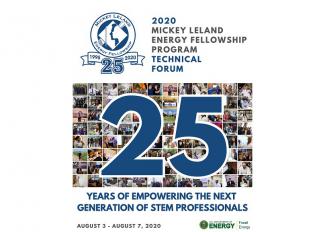Students from all around the country demonstrated their research prowess during the Department of Energy’s 25th Mickey Leland Energy Fellowship (MLEF) summer internship program via virtual conference throughout the week of Aug. 3-7, 2020.
The MLEF Technical Forum provided an opportunity for the participants to share their research, outcomes, and what they learned collaborating with their mentors and research advisors throughout their nine-week internship. NETL hosted 29 Mickey Leland fellows this year, representing 26 colleges and universities from 16 states, with two participants from Puerto Rico.
Among this year’s MLEF participants was Valen Ortiz de Zarate, a senior civil environmental engineering major at Carnegie Mellon University from Burke, Virginia. Throughout the program she trained in the use of the OLI Systems’ aqueous chemistry software (OLI Stream Analyzer), then used it to predict whether arsenic, mercury, nitrates, and selenium of several power plants were in the aqueous state or precipitated solid state, with the goal of informing the design of more cost effective processes to treat flue gas desulfurization (FGD) effluent before it is discharged to local waterways.
Using real data collected by the EPA and the OLI software, Ortiz de Zarate modeled the FGD effluent streams from eight power plants. Having this data in OLI has been incredibly valuable because the data has been exported to OLI Flowsheet where NETL researchers are designing treatment processes.
“I found out that having an FGD treatment system in place will prevent plants from discharging effluents that have these pollutants,” she explained. “Any sort of pollutant left in the waters will not only hurt animals and the ecosystem, but that water has to be treated for drinking. Any pollutants such as mercury and arsenic that’s entering our waterways will be harmful if it’s not treated correctly.”
Another participant this year was Maia Zhang, a student from Newark, New Jersey, studying mathematics and French at Cornell University. Her research project during MLEF involved the Lab’s CT scanner and flow facility. Under the guidance of her mentor, Dustin Crandall, Zhang examined multi-scale images of rocks using various machine learning techniques to link small scale features to observed flow parameters obtained from larger samples. She said her experience left an impact regarding career paths after school.
“A valuable takeaway (hard to say just one) was that I feel I have more direction in what I want to pursue for higher education and in my career,” she said. “This was a first chance to do real research and I no longer feel unprepared to go for it in the future! I didn’t have clear goals before this program, but now more than ever, I feel like I want to continue researching in energy and possibly with the DOE. First, though, I plan to get a masters (at least) in geology/geosciences.”
Damian Archer, an earth science and policy major at Pennsylvania State University from Philadelphia, investigated the impact that legacy natural gas infrastructure has on communities throughout the summer. He said the internship program had a lot to offer even in a virtual setting and encouraged fellow students interested in MLEF to pursue it.
“The most valuable part of this experience has been putting to action some of the networking tips I accumulated as well as tapping into the experiences of other people on the team about how they were able to secure a job with DOE,” he said. “For those considering or going into the MLEF, I would say that if you are looking for a chance to get real-life experience while being mentored by top professionals in their field, then pursing this opportunity will exceed your expectations. Even while virtual, I would not have learned some of the skills I have acquired through the MLEF in my undergraduate career.”
Sponsored by DOE’s Office of Fossil Energy, MLEF kicked off its 25th year with a class of 52 undergraduate and graduate students. The program was named after late six-term Congressman George Thomas “Mickey” Leland III of Texas, a passionate advocate on many issues including hunger and public health who died in a 1989 plane crash while on a trade mission to Ethiopia.
The MLEF program was created in 1995 to improve opportunities for under-represented students in science, technology, engineering, and math (STEM) fields and strengthen a diverse pipeline of future STEM professionals. Having mentored nearly 1,000 talented students from across the nation, the program provides participants the unique opportunity to gain direct research experience with fossil energy. Students gain insight into how DOE is working to meet the energy challenges of the future, including policy and regulation, project finance, and strategic performance measures at Office of Fossil Energy Headquarters.
NETL has participated in the program since its inception and traditionally hosts the largest number of fellows across all of DOE.
The 52 interns who participated across DOE in 2020 represented colleges and universities throughout the nation including Puerto Rico and the District of Columbia. The students will make real and lasting contributions to NETL’s mission to ensure the safe and sustainable use of our nation’s fossil energy resources.
DOE’s National Energy Technology Laboratory develops and commercializes advanced technologies that provide reliable and affordable solutions to America's energy challenges. NETL’s work supports DOE’s mission to advance the national, economic, and energy security of the United States.




